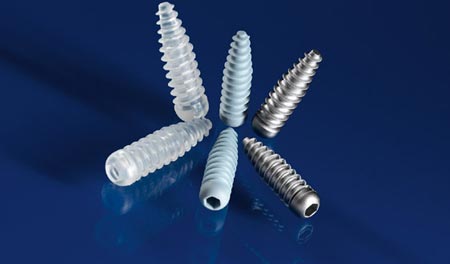'Connecting' ligament with self-destructing screw
Concerns about athletes' surgery to repair ligament injuries are reduced with new inventions by Fraunhofer Academy scientists, Benmen about the type of self-destructing bio-screw.
For football players, skiers or tennis players, their most anxious and fearful is getting caught in the trauma that leads to a broken cruciate ligament at the knee.
At that time, they had to undergo an operation to restore the stability of the joint. During surgery, a broken or damaged ligament is replaced by another piece of ligament from the leg, fixed to the bone with interference screws.
The problem here is that these screws are made of titanium. This means that, after a certain time, the patient must undergo another painful surgery to remove the screw.
Therefore, researchers from the Fraunhofer Institute of Applied Materials and Production Engineering (IFAM) in Bremen have developed a fixed screw that is able to adapt to the body and has The ability to self-decompose after a while without being toxic to the body. Scientists want to reduce the pain and time of patients with ligament breaks or patients with bone related problems.
Dr. Philip Imgrund, head of IFAM's Department of Body Biological Materials Technology, said: "We have created a new type of biomaterial in a biochemical form that is powerful but capable of decomposing. Depending on condition and composition, bio-screw screws self-destruct within about 24 months ".

The new type of bio-screw has the ability to self-destruct so the patient does not need surgery to remove it.
These self-biodegradable screws are made of polylactic acid, which is commonly used in the medical field. However, in the past, they showed the disadvantage that when worn out due to use time, they can leave holes in the bone.
IFAM's team has supplemented the material and developed a mixture of polylactic acid and hydroxylapatite-a type of porcelain that is the main ingredient in bone. This new type of screw material has a higher proportion of hydroxylapatite as well as promotes bone growth under the implant.
This new type of bio screw has almost the same hardness as real bone. If normal bone can withstand the pressure of 130-170 N / mm 2 , this screw has a hardness of up to 130 N / mm 2 , a real breakthrough.
To be able to create this type of screw, the scientists did not crush the material but used the method of framing and compressing at 140 degrees C. While pressing the powder form must be done at the press temperature very high, up to 1,400 degrees C.
In the future, engineers are looking to continue to develop similar types of biological implants with the above energy-saving process.
- America develops 'bullets' thoroughly targeted, not kill people
- Previous cross ligament injury
- New parts discovered in the human knee
- Russia invented 'self-destructing satellite' to prevent cosmic garbage
- 'Shocking' findings about your body
- Spiral image on airplane engine? Do people draw for fun?
- Discarded, dissolved in water for 30 minutes
- Connect the bones of the screw made from ... human bones
- Detecting new forms of light increases Internet speed
- The least known parts of the human body
- Connecting the brain that helps people share their thoughts has become a real technology!
- The way CIA hacked computers without connecting to the internet
 Daily use inventions come from universities
Daily use inventions come from universities Special weight loss device helps prevent appetite
Special weight loss device helps prevent appetite 8 inventors were killed by their own inventions
8 inventors were killed by their own inventions Iran invented a motor car powered by water
Iran invented a motor car powered by water